Best Quotes on Life Insurance (Safety First!) is a thoughtful collection of meaningful sayings that highlight the value, purpose, and emotional depth behind life insurance. These quotes go beyond policies and premiums—they express the real reason people choose to protect their families: love, care, and a sense of responsibility. The phrase “Safety First!” reminds us that planning ahead is one of the most selfless and protective acts we can do.
This guide is filled with inspiring, funny, and heartfelt quotes that make the idea of life insurance more relatable and human. Each quote is crafted to speak directly to the heart, helping people connect emotionally with the importance of being prepared. It’s not just about financial security—it’s about peace of mind and love that lasts even beyond life.
Best Quotes on Life Insurance (Safety First!) offers comfort, motivation, and a fresh perspective on a topic many often overlook. These quotes make it easier to start meaningful conversations and take smart, loving steps toward protecting what matters most.
Powerful Life Insurance Quotes That Resonate
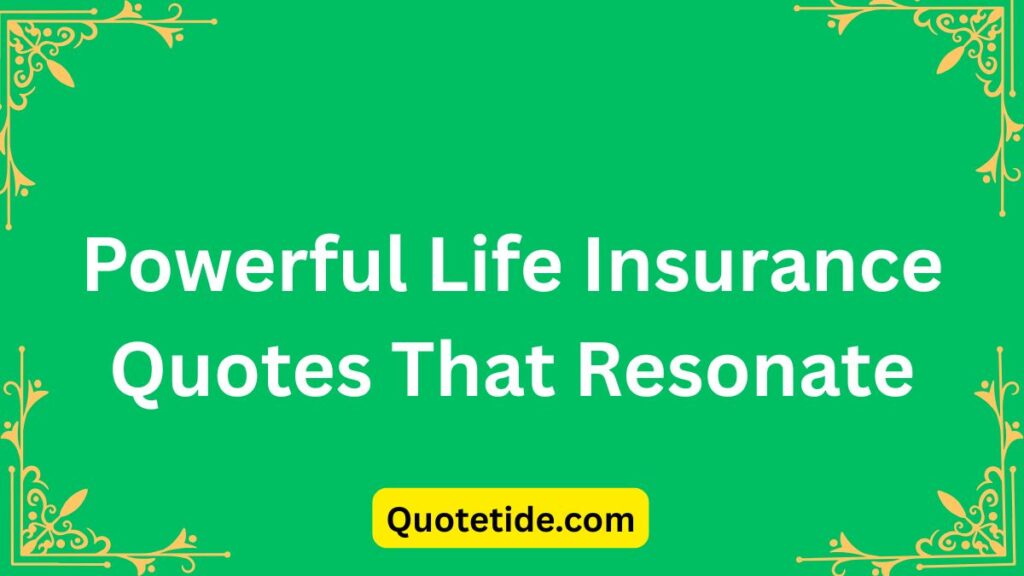
Timeless Wisdom About Protection
When it comes to financial protection, sometimes the most profound truths come in the simplest packages. These quotes capture the essence of why life insurance matters:
- “Life insurance isn’t an expense—it’s a shield protecting those who depend on you.”
- “The question isn’t if you can afford life insurance, but if your family can afford to live without it.”
- “When you buy life insurance, you’re buying time for your family to heal without financial stress.”
- “Life insurance transforms ‘what if’ into ‘even if’—giving your family peace of mind in uncertain times.”
- “A life insurance policy is the only love letter that pays dividends long after you’re gone.”
- “The premium you pay today buys your family’s economic security tomorrow.”
- “Life insurance doesn’t replace you—it replaces your income when your family needs it most.”
- “Think of life insurance as the financial foundation that stands when everything else falls.”
- “The greatest gift you can leave behind isn’t just memories, but security.”
- “Life insurance: because love means never saying ‘I should have planned better.'”
- “Your life’s value can’t be measured in dollars, but its absence can certainly be felt in them.”
- “Good parents provide. Great parents provide for family even after they’re gone.”
“The best time to plant a tree was 20 years ago. The second best time is now.” – Chinese Proverb
This wisdom applies perfectly to life insurance—the best time to buy is yesterday; the second best time is today.
Lighthearted Takes on a Serious Subject
Sometimes humor helps us approach difficult topics. These funny insurance sayings take a lighter approach to a serious subject:
- “Life insurance is like a parachute—if you need it and don’t have it, you’ll never need it again!”
- “I got life insurance because apparently ‘thoughts and prayers’ don’t pay mortgages.”
- “My retirement plan? Die with just enough life insurance that my kids remember me fondly.”
- “Life insurance: for when ‘it’ll never happen to me’ happens to you.”
- “Got life insurance because my family would miss me… and my paycheck even more.”
- “If life gives you lemons, make lemonade. If life takes you away, make sure you had insurance.”
- “Life insurance: turning ‘I should have’ into ‘I’m glad I did.'”
- “They say money can’t buy happiness, but a good life insurance policy can buy mental ease.”
- “Life insurance is like a fire extinguisher—you hope you never need it, but you’d be chaotic not to have one.”
- “My significant other says I’m priceless. My insurance company had a specific number in mind.”
Motivational Perspectives on Financial Planning
These inspirational insurance quotes remind us that securing your family’s future is an act of courage and love:
- “Buying life insurance isn’t admitting defeat—it’s claiming victory over life’s uncertainties.”
- “Your life insurance policy is the financial lifeline that keeps your family afloat when storms hit.”
- “Every premium payment writes another chapter in your family’s story of security.”
- “Life insurance turns your final goodbye into a lasting ‘I’ve got you covered.'”
- “The bravest financial planning decision you’ll make is planning for a world where you no longer exist.”
- “Life insurance doesn’t just protect assets—it protects dreams, educations, and futures.”
- “The ultimate act of love: planning for your family’s well-being in your absence.”
- “Your life insurance policy transforms worry into confidence, fear into security.”
- “Life insurance: because your love should continue even when your heartbeat doesn’t.”
- “A life well-lived includes planning ahead well for those who live on after you.”
Historical Perspectives on Life Insurance
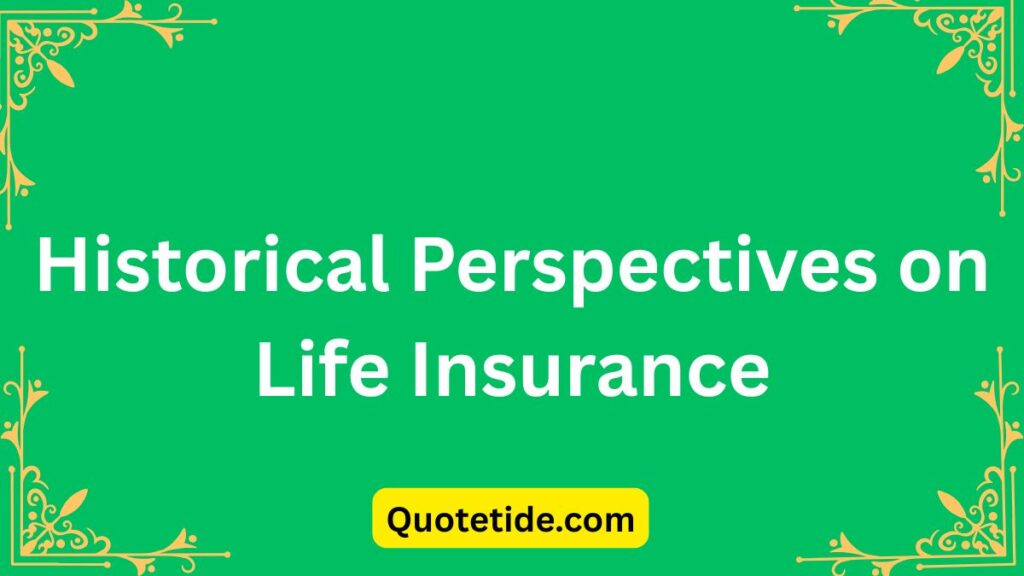
The concept of financial protection through insurance isn’t new. Throughout history, wise minds have recognized the importance of preparing for uncertainties:
- Benjamin Franklin: “In this world, nothing is certain except death and taxes—prepare for future events accordingly.”
- Winston Churchill: “Let our advance worrying become advance thinking and planning.”
- Suze Orman: “If a child, a spouse, a life partner, or a parent depends on you and your income, you need life insurance.”
- Dave Ramsey: “Life insurance is one product that keeps loving your family after you’re gone.”
| Historical Figure | Quote on Life Insurance | Key Insight |
|---|---|---|
| Benjamin Franklin | “In this world, nothing is certain except death and taxes.” | Preparation is essential |
| Winston Churchill | “Let our advance worrying become advance thinking and planning.” | Convert anxiety to action |
| Suze Orman | “If anyone depends on you and your income, you need life insurance.” | Responsibility to dependents |
| Dave Ramsey | “Life insurance is one product that keeps loving your family after you’re gone.” | Lasting impact of coverage |
These historical perspectives remind us that financial protection through life insurance has long been recognized as a cornerstone of prudent family planning.
The Psychology Behind Life Insurance Decisions
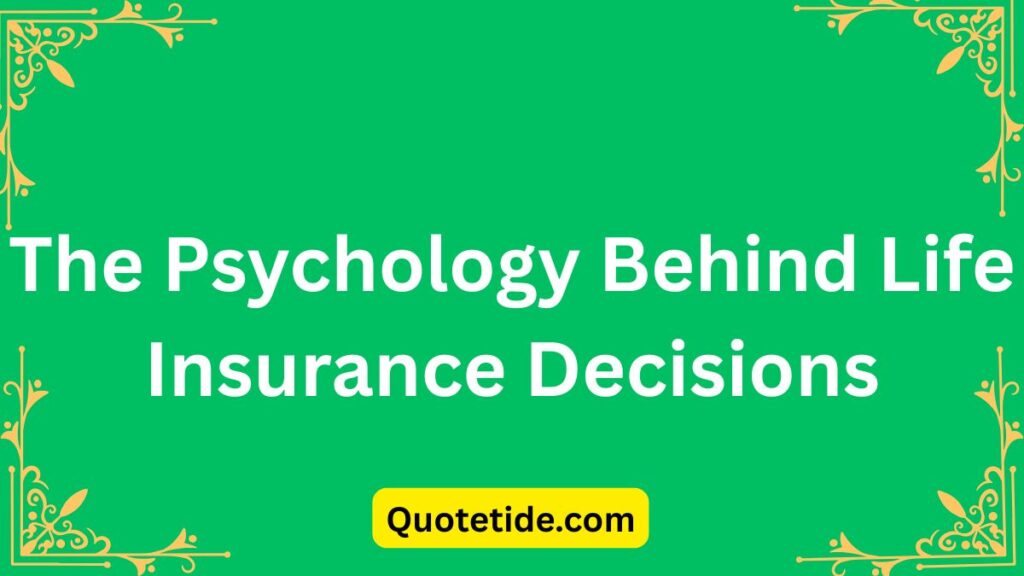
Understanding why we sometimes procrastinate on such important decisions can help us overcome mental barriers to securing proper coverage:
The Immortality Bias
We naturally believe bad things happen to others, not us. This cognitive bias leads many to postpone getting life insurance until it’s too late or more expensive. Recognizing this bias is the first step to overcoming it.
Decision Paralysis
The multitude of coverage options can create decision paralysis. With so many insurance plans to choose from, many people end up choosing nothing at all. Breaking down the decision into smaller steps can help overcome this barrier.
Present Bias
Our brains are wired to prefer immediate rewards over future benefits. The monthly premium costs of life insurance are immediate, while the benefits may never be personally experienced. Reframing life insurance as an immediate act of love and peace of mind can help overcome this bias.
Superstitious Thinking
Some people avoid buying life insurance because they believe discussing death somehow invites it. This magical thinking can be countered with rational assessment of risks and benefits.
“The emotional comfort of knowing your family is protected can be worth far more than the premium you pay.”
Case Study: The Procrastination Effect
John’s Story: At 32, John knew he needed life insurance but kept putting it off. “I’m young and healthy,” he reasoned. “There’s plenty of time.” When he finally applied at 42, his premiums were 87% higher than they would have been ten years earlier. Moreover, a minor health condition discovered during his medical exam further increased his rates.
The Lesson: The best time to buy life insurance is when you’re young and healthy. Delaying often results in significantly higher costs or, worse, becoming uninsurable when you need coverage most.
Choosing the Right Coverage: Beyond the Quotes
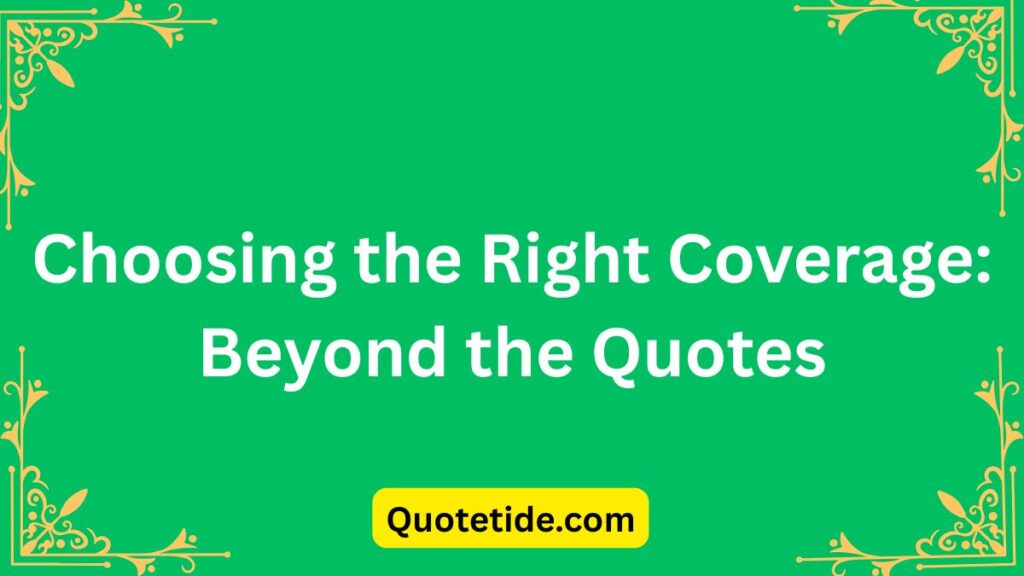
While inspirational quotes can motivate action, choosing the right insurance plan requires practical knowledge:
Assess True Financial Needs—Not Just Rough Estimates
Bold fact: Most Americans underestimate their life insurance needs by $200,000 or more.
Rather than guessing, use the “DIME” formula to calculate your actual needs:
- Debts: All outstanding debts (excluding mortgage)
- Income: Income replacement needed (typically 10-15 times annual income)
- Mortgage: Remaining mortgage balance
- Education: Estimated college costs for children
Factor in Inflation and Future Cost Increases
A life insurance policy that seems adequate today may fall short in 20 years due to inflation. Consider:
- College costs increase at roughly 5-8% annually
- Healthcare expenses rise 4-6% per year
- General inflation averages 2-3% annually
When calculating coverage, build in a buffer for these inevitable increases to ensure genuine financial protection.
Review and Adjust Your Policy at Major Life Milestones
Your life insurance needs will change throughout life. Review your policy when:
- Getting married
- Buying a home
- Having children
- Changing jobs
- Starting a business
- Caring for aging parents
- Approaching retirement
Each milestone may require adjustments to your coverage options to ensure your family safety remains intact.
The Different Types of Life Insurance Explained
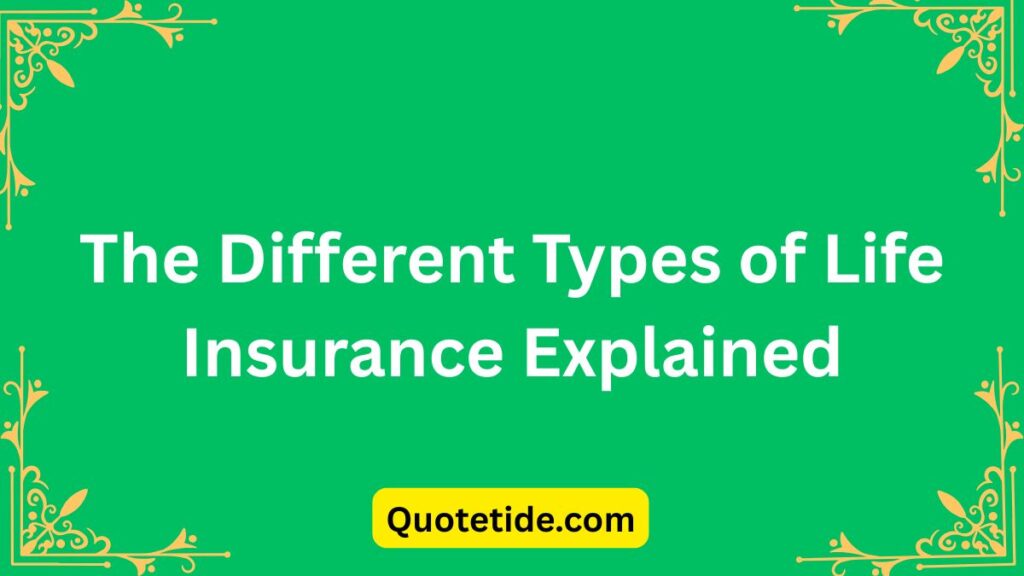
Understanding the basic types of life insurance policies can help you make informed decisions:
Term Life Insurance
Term life insurance provides coverage for a specific period—typically 10, 20, or 30 years. It’s generally the most affordable option and offers straightforward financial protection. Best quotes on life insurance safety first.
Pros:
- Lower premiums
- Straightforward benefits
- Perfect for specific timeframes (raising children, paying off mortgage)
Cons:
- No cash value accumulation
- Coverage expires when term ends
- Renewal costs increase with age
Whole Life Insurance
Whole life policies provide permanent coverage with a cash value component that grows over time.
Pros:
- Lifetime coverage
- Cash value accumulation
- Fixed premiums
- Potential dividends
Cons:
- Significantly higher premiums (5-15 times more than term)
- Lower initial death benefit for same premium
- Lower return on investment component compared to other options
Universal Life Insurance
Universal life offers permanent coverage with flexible premiums and cash value that earns interest.
Pros:
- Flexible premium payments
- Adjustable death benefits
- Cash value accumulation
- More investment options
Cons:
- Performance tied to interest rates
- Requires active management
- More complex than term insurance
- Higher fees and expenses
“The right type of insurance isn’t about perfection—it’s about alignment with your specific needs, goals, and budget.”
How to Use These Life Insurance Quotes

These insurance quotes aren’t just inspirational words—they’re tools that can transform how we think about and approach financial protection:
In Family Discussions
Use these quotes to break the ice when discussing life insurance with your spouse or family members. Sometimes a powerful quote can express what we struggle to say ourselves.
During Financial Planning Sessions
Financial advisors can use these quotes to help clients understand the emotional value of life insurance, not just the numerical aspects. Best quotes on life insurance safety first.
As Social Media Content During Life Insurance Awareness Month
September is Life Insurance Awareness Month. Share these quotes on social media to promote financial protection awareness among your network.
Personal Reminders When Procrastinating
Keep a favorite quote about life insurance somewhere visible as a reminder of why this financial planning step matters.
Real-Life Impact: Stories That Remind Us Why It Matters
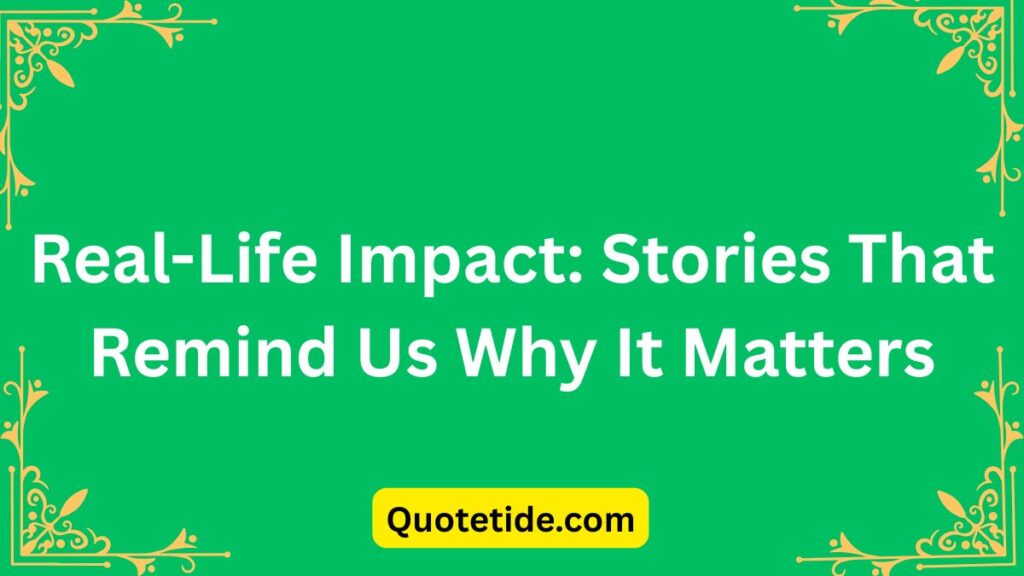
Behind every statistic are real families whose lives were transformed—for better or worse—by life insurance decisions.
Case Study 1: The Matthews Family – Protected by Planning
When David Matthews died unexpectedly at 42, his $1 million term policy meant his wife Sarah didn’t have to sell their home or compromise their children’s education. The financial protection provided time for emotional healing without financial pressure.
“That life insurance policy was the last gift my husband gave us,” Sarah says. “While we missed him terribly, we never had to worry about how we would survive financially.”
Case Study 2: The Thompsons – The Cost of Delay
Unlike David, Michael Thompson had always planned to get life insurance “someday.” When he passed away at 38, his wife Lisa and their three children had only his workplace policy—$50,000, which barely covered funeral expenses and outstanding medical bills.
“People don’t realize how quickly financial pressure compounds grief,” Lisa shares. “While dealing with the emotional loss, I also had to return to work immediately, sell our home, and move the children to a new school district we could afford. The stress was overwhelming.”
Case Study 3: The Singh Family – Business Continuity
Ajay Singh used life insurance strategically to protect not just his family but also his business. When he died, his insurance plan provided funds for his business partner to buy his share from his family, ensuring both business continuity and financial security for his wife and children. Best quotes on life insurance safety first.
“The business insurance plan meant everyone was protected,” his widow Priya explains. “His partners kept the business running, and we received fair value for his share without forcing a distress sale.”
Key Takeaways: The Non-Negotiable Facts
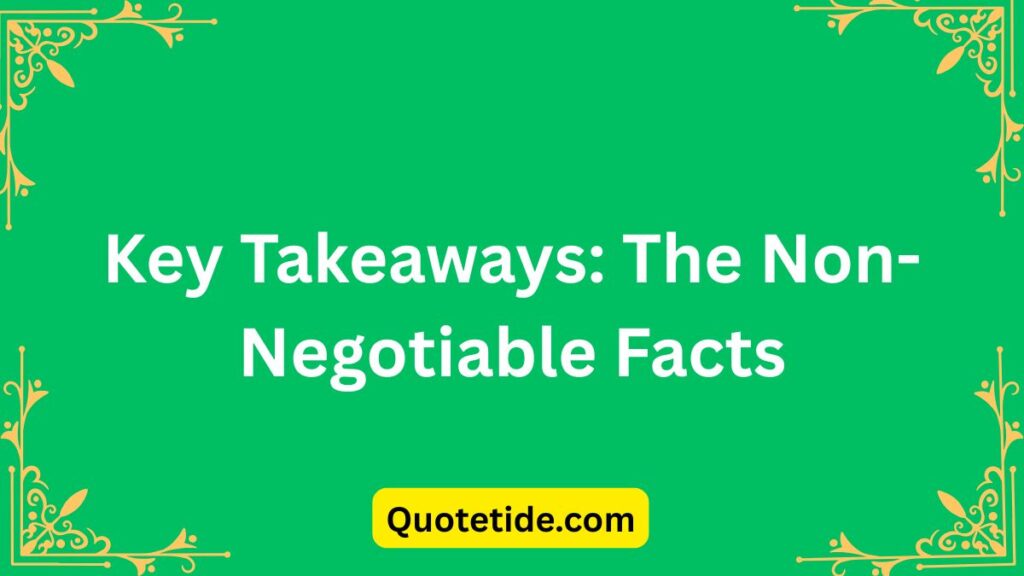
When it comes to life insurance, certain truths are non-negotiable:
- Life insurance isn’t optional for those with dependents
- The best time to buy is when you’re young and healthy
- Term insurance offers the most coverage for your dollar
- Employer coverage alone is rarely sufficient
- Regular policy reviews ensure your coverage grows with your life
“Life insurance is the cornerstone of sound financial planning. It can help put you exactly where you want to be.” – Ben Feldman, Insurance Industry Legend
Common Myths About Life Insurance Debunked
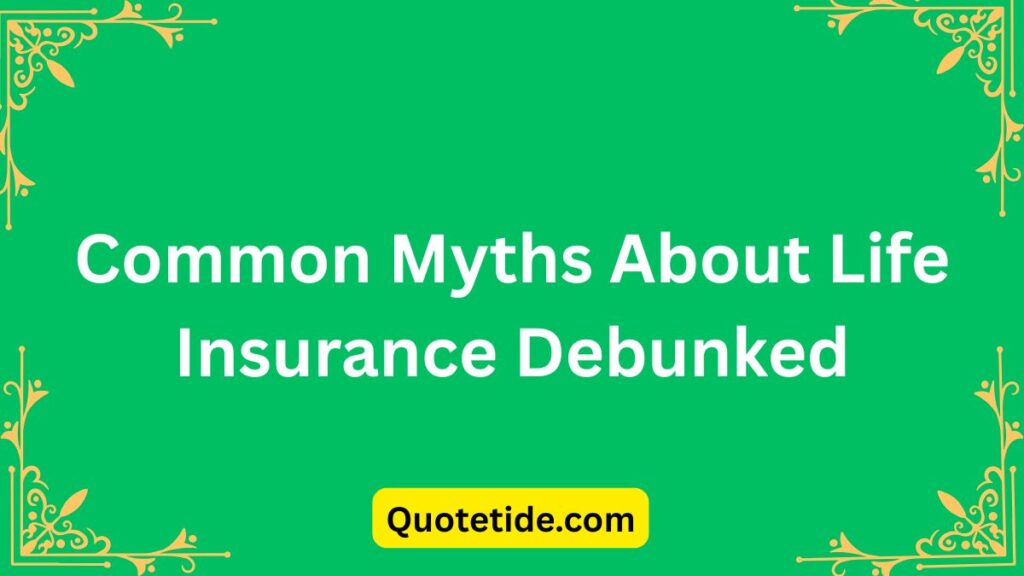
Many misconceptions prevent people from obtaining adequate coverage:
Myth 1: “I’m single, so I don’t need life insurance.”
Truth: Single people often have debts or funeral expenses that would burden family members. Additionally, future planning while young and healthy locks in better rates.
Myth 2: “Life insurance through my employer is sufficient.”
Truth: Employer-provided coverage typically offers only 1-2 times your salary—far below the recommended 10-15 times income for adequate family protection. Additionally, this coverage usually ends when employment does. Best quotes on life insurance safety first.
Myth 3: “Life insurance is too expensive.”
Truth: Term life insurance for a healthy 30-year-old can cost less than $30 per month for $500,000 in coverage—less than most people spend on streaming services or coffee.
Myth 4: “I’m healthy, so I can wait to buy life insurance.”
Truth: Health changes unpredictably. Each year of delay increases premium costs by approximately 8-10%. Securing your family’s future early means better rates and guaranteed insurability. Best quotes on life insurance safety first.
Myth 5: “Stay-at-home parents don’t need life insurance.”
Truth: The economic value of services provided by stay-at-home parents (childcare, household management, etc.) exceeds $178,000 annually according to Salary.com. Replacing these services would create significant financial strain.
The Emotional Economics of Life Insurance
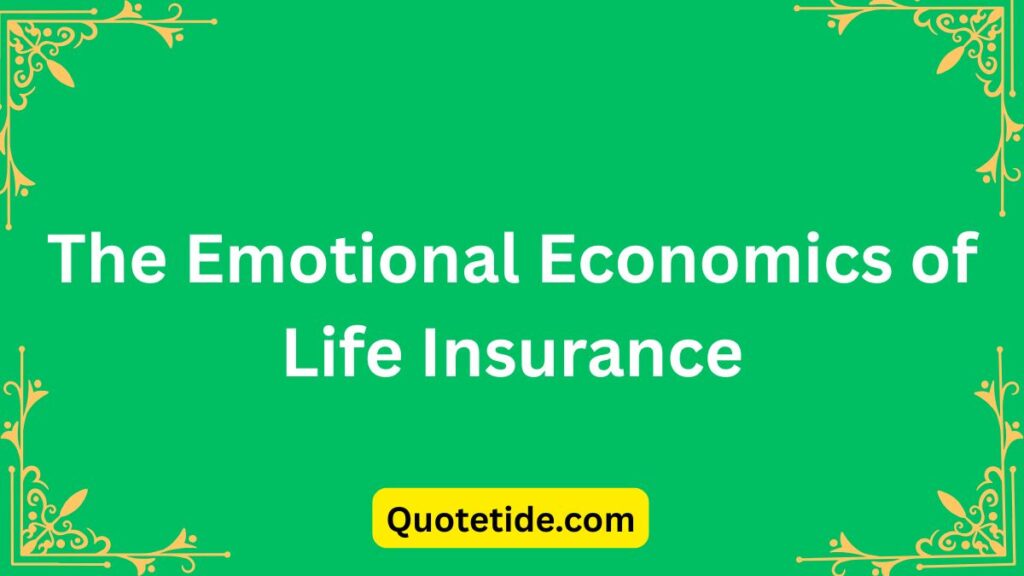
While life insurance is fundamentally a financial product, its true value lies in the emotional impact it provides:
Converting Anxiety to Peace
A remarkable 68% of life insurance policyholders report significantly lower anxiety about their family’s financial future compared to those without coverage. This mental ease is an immediate benefit you experience while still alive.
Demonstrating Love Through Action
Actions speak louder than words. A life insurance policy is a tangible demonstration of your commitment to protecting loved ones, converting abstract love into concrete financial protection. Best quotes on life insurance safety first.
Creating Space for Grief
Proper insurance coverage creates space for emotional processing without financial pressure. Families with adequate life insurance report healthier grief processes and better long-term emotional outcomes following the loss of a loved one.
“The act of securing life insurance provides a unique form of emotional security that few other financial products can match.”
Life Insurance as Part of a Holistic Financial Strategy
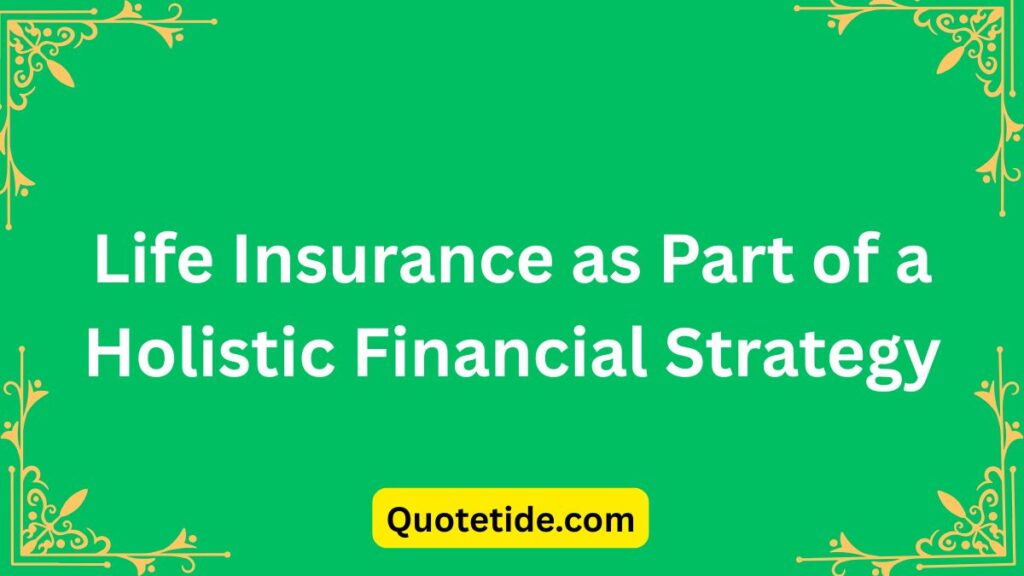
Life insurance doesn’t exist in isolation—it’s part of a comprehensive financial planning strategy:
The Protection Triangle
A solid financial foundation includes three essential protections:
- Emergency fund: For immediate, unexpected expenses
- Life insurance: For long-term family protection in your absence
- Disability insurance: For income protection if you’re unable to work
All three work together to create a comprehensive safety net. Best quotes on life insurance safety first.
Wealth Building vs. Wealth Protection
While investment strategies focus on building wealth, life insurance ensures that wealth (or its potential) isn’t lost prematurely. Both are necessary for complete financial protection.
Estate Planning Integration
Life insurance can be strategically integrated with wills, trusts, and other estate planning tools to minimize taxes and maximize your legacy of care. Best quotes on life insurance safety first.
Future Trends in Life Insurance
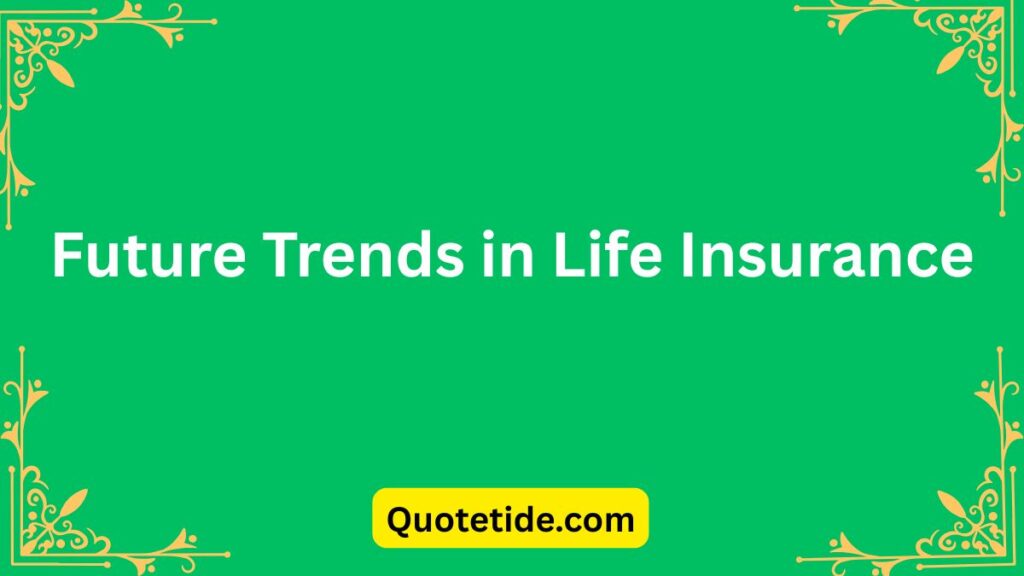
The life insurance industry is evolving rapidly to meet changing consumer needs:
Simplified Underwriting
Traditional medical exams are being replaced by data-driven underwriting. Many policies now offer accelerated approval processes using existing medical records and predictive analytics.
Personalized Policies
New insurance plans increasingly offer personalized coverage options based on lifestyle, health metrics, and specific needs rather than one-size-fits-all approaches.
Integration with Health and Wellness
Some innovative policies now integrate with health tracking devices, offering premium discounts for maintaining healthy habits—creating immediate benefits beyond the eventual payout.
Digital Management Tools
Modern life insurance policies increasingly come with digital tools for policy management, beneficiary updates, and even financial planning resources. Best quotes on life insurance safety first.
Actionable Steps: From Quotes to Coverage
Inspiration without action accomplishes nothing. Here’s how to move from appreciating these quotes to actually securing your family’s future:
1. Calculate Your Actual Needs
Use online calculators or the DIME formula mentioned earlier to determine your specific coverage requirements.
2. Research Policy Types
Determine whether term, whole, or universal life insurance best meets your needs and budget.
3. Compare Multiple Providers
Get quotes from at least three different insurance companies to ensure competitive pricing.
4. Consider Working with an Independent Agent
Independent agents can offer policies from multiple companies, providing more options than captive agents who sell only one company’s products.
5. Be Honest on Your Application
Dishonesty on applications can lead to claim denials later. Full disclosure now ensures reliable coverage when it matters most.
6. Review Beneficiary Designations
Ensure your beneficiaries are correctly named and updated after major life events.
7. Set Calendar Reminders for Policy Reviews
Set annual reminders to review your coverage and make necessary adjustments as your life circumstances change.
Conclusion:
While these quotes capture the essence of why life insurance matters, the real power lies in action. The most meaningful quote will always be the one that moves you to protect your loved ones today, not tomorrow.
Remember that life insurance isn’t about death—it’s about life and love continuing even when you can’t be there in person. It’s about creating a legacy of care that extends beyond your lifetime.
As you consider the wisdom shared in these quotes, ask yourself: What story will your financial decisions tell about your love for your family? Will it be a story of procrastination and missed opportunities, or one of foresight, preparation, and enduring care?
The choice—and the power to act on it—is yours.
FAQs
How much life insurance do I actually need?
Most financial experts recommend coverage of 10-15 times your annual income, plus additional amounts for specific obligations like college education funding or mortgage payoff.
What’s the difference between term and whole life insurance?
Term life insurance provides coverage for a specific period (usually 10-30 years) while whole life offers permanent coverage plus a cash value component that grows over time. Term is significantly less expensive for the same death benefit.
Can I have multiple life insurance policies?
Yes, you can own multiple policies from different companies. This strategy, called “laddering,” allows you to have different amounts of coverage for different periods based on changing needs throughout life.
Does life insurance cover suicide?
Most life insurance policies cover suicide, but only after a waiting period (typically two years) from when the policy was issued.
What happens if I outlive my term life insurance policy?
If you outlive a term policy, the coverage simply ends. Many policies offer conversion options to permanent insurance or the ability to renew (at higher rates) without a new medical exam.
Is life insurance taxable?
Death benefits from life insurance are generally tax-free to beneficiaries. However, any interest earned on the proceeds after death may be taxable.
Can I change my beneficiaries?
Yes, you can change beneficiaries at any time (unless you’ve made an irrevocable beneficiary designation). Review your beneficiaries after major life events like marriage, divorce, or the birth of children.
Remember: The best life insurance quote isn’t one you read—it’s one you act on. Secure your family’s future today.

Ashir Been is the owner and admin of QuoteTide, a platform dedicated to providing a rich collection of quotes, messages, and creative texts for various occasions. From motivational quotes to heartfelt wishes and flirty texts, Ashir ensures that QuoteTide remains a go-to destination for expressive and engaging content. With a passion for words and digital creativity, he curates high-quality content to help users effortlessly share their emotions and thoughts.
